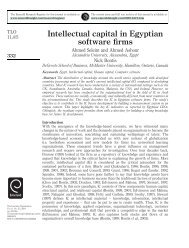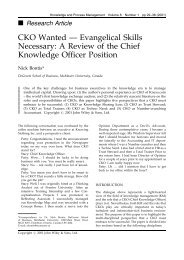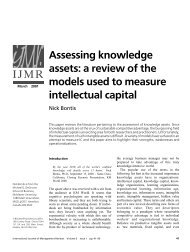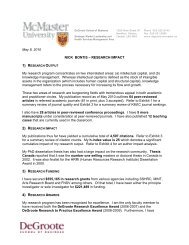A scientometric analysis of knowledge management and ... - Emerald
A scientometric analysis of knowledge management and ... - Emerald
A scientometric analysis of knowledge management and ... - Emerald
You also want an ePaper? Increase the reach of your titles
YUMPU automatically turns print PDFs into web optimized ePapers that Google loves.
academics from various disciplines, who also started contributing to the literature. The role<br />
<strong>of</strong> non-academic researchers, who represented 17 percent <strong>of</strong> all KM/IC authors identified in<br />
this study, has been dramatic in terms <strong>of</strong> their relative contribution to the scholarly domain. In<br />
fact, it is practitioners who identified a need for KM/IC, developed its foundations, <strong>and</strong><br />
suggested avenues for future scholarly research.<br />
However, by 2008, practitioners’ contributions dropped to only ten percent <strong>of</strong> all KM/IC<br />
authors. Pragmatic field studies <strong>and</strong> experiments, which require an active cooperation <strong>of</strong><br />
businesses <strong>and</strong> the involvement <strong>of</strong> practitioners, constitute only 0.33 percent <strong>of</strong> all inquiry<br />
methods. There has also been a decline in case studies from 26 percent (1994-2004) to 22<br />
percent (2005-2008) in favor <strong>of</strong> empirical research in form <strong>of</strong> surveys <strong>and</strong> interviews that are<br />
sometimes referred to as more scientifically rigorous. The same phenomenon was observed<br />
in the <strong>management</strong> information systems domain when the scholarly contribution <strong>of</strong><br />
practitioners became virtually non-existent (Serenko et al., 2008). As a result, the practical<br />
relevance <strong>and</strong> applicability <strong>of</strong> the information systems scholarly research was questioned<br />
(Baskerville <strong>and</strong> Wood-Harper, 1996; Benbasat <strong>and</strong> Zmud, 1999; Kock et al., 2002; Desouza<br />
et al., 2006; Benamati et al., 2007). For example, a survey <strong>of</strong> IS pr<strong>of</strong>essionals demonstrated<br />
that most <strong>of</strong> them are unaware <strong>of</strong> academic publications, believe that scholarly articles are<br />
outdated, difficult to read <strong>and</strong> <strong>of</strong>fer no value (Pearson et al., 2005). Recently, Booker et al.<br />
(2008) interviewed a number <strong>of</strong> KM/IC practitioners <strong>and</strong> also concluded that they experience<br />
difficulty accessing <strong>and</strong> utilizing academic <strong>knowledge</strong> for managerial decision-making. At<br />
the same time, these pr<strong>of</strong>essionals believed that there is a great value in KM/IC scholarly<br />
<strong>knowledge</strong>.<br />
Overall, there is a great danger that KM/IC may lose its practical side <strong>and</strong> become a pure<br />
scholarly discipline. Even though scholarly relevance <strong>and</strong> rigor are a must, the needs <strong>of</strong> the<br />
KM/IC industry should also be considered. One <strong>of</strong> the best approaches is to recommend<br />
that academic researchers increasingly collaborate with industry practitioners on various<br />
research projects. Researchers should increase their usage <strong>of</strong> the currently<br />
under-represented inquiry methods, for example, interviews, field experiments, <strong>and</strong><br />
various qualitative methods including ethnography, action research, focus groups,<br />
interpretive study, <strong>and</strong> examination <strong>of</strong> texts. Journal editors <strong>and</strong> reviewers should<br />
welcome submissions that involve academic-practitioner collaborations, for example,<br />
studies reporting on a field experiment in an actual organization.<br />
Implication IV: a minority <strong>of</strong> countries generates the most research output – the existence <strong>of</strong><br />
the Matthew effect for countries was confirmed in the KM/IC domain<br />
In this project, 73 contributing countries were identified. The five leading countries (the USA,<br />
the UK, Australia, Spain <strong>and</strong> Canada) generated 57 percent <strong>of</strong> the entire research output.<br />
Twenty-one percent <strong>of</strong> all research was generated by the USA alone. This suggests that the<br />
production <strong>of</strong> scholarly KM/IC research is not distributed equally among the nations.<br />
Instead, a h<strong>and</strong>ful <strong>of</strong> countries accounts for the majority <strong>of</strong> publications.<br />
A related phenomenon, referred to as the Matthew effect for countries (Bonitz et al., 1997),<br />
has been observed in virtually all scientific fields. The Matthew effect, introduced in the<br />
seminal works by Merton (1968, 1988) refers to the situation when an initial advantage<br />
gained by an individual scholar, institution or country leads to further advantage, whereas<br />
their less fortunate counterparts receive little or no gain. It is likely that wealthy countries were<br />
able to initially invest heavily in research institutions, attract top faculty, <strong>and</strong> provide research<br />
grants. This in turn facilitates the production <strong>of</strong> more research in those select countries, <strong>and</strong><br />
‘‘ In terms <strong>of</strong> the role <strong>of</strong> practitioners, their contribution to the<br />
body <strong>of</strong> <strong>knowledge</strong> has been declining. ’’<br />
VOL. 14 NO. 1 2010 j j JOURNAL OF KNOWLEDGE MANAGEMENT PAGE 17








